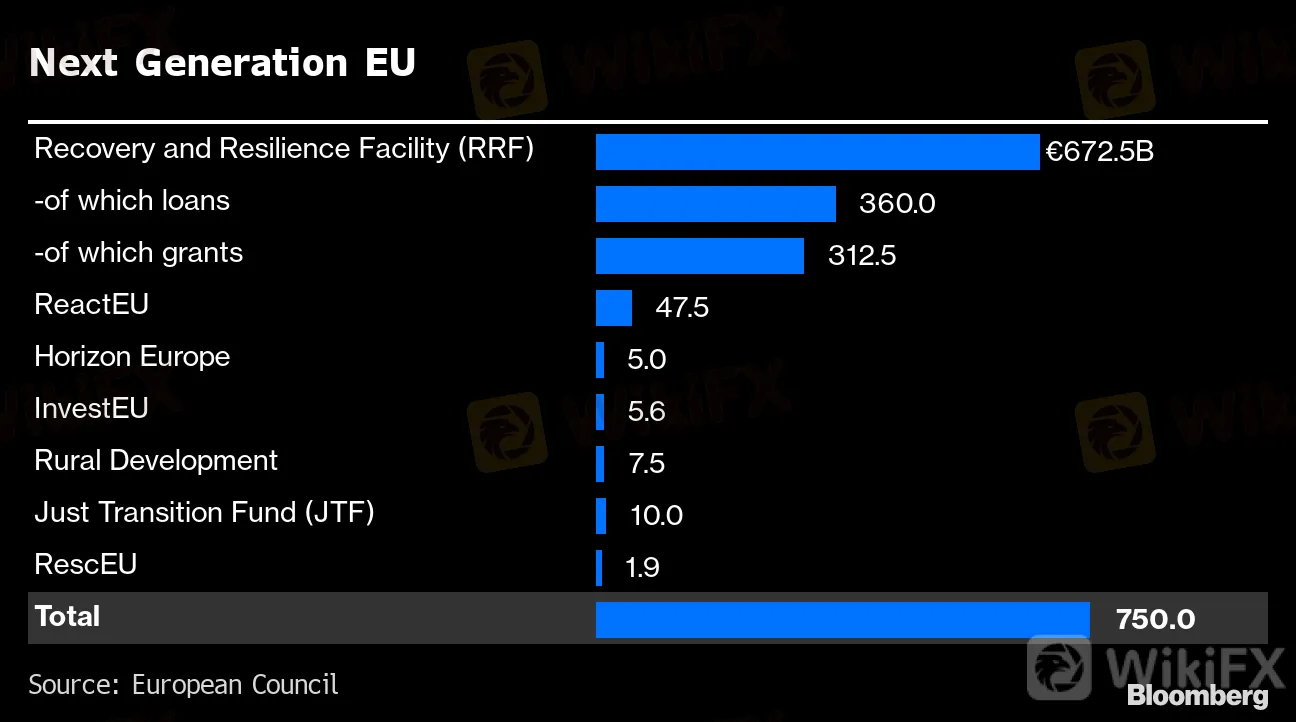简体中文
繁體中文
English
Pусский
日本語
ภาษาไทย
Tiếng Việt
Bahasa Indonesia
Español
हिन्दी
Filippiiniläinen
Français
Deutsch
Português
Türkçe
한국어
العربية
EU Clinches Massive Stimulus Deal to Bind Continent Together
Abstract:European Union leaders agreed on an unprecedented stimulus package worth 750 billion euros ($860 billion) to pull their economies out of the worst recession in memory and tighten the financial bonds holding their 27 nations together.
European Union leaders agreed on an unprecedented stimulus package worth 750 billion euros ($860 billion) to pull their economies out of the worst recession in memory and tighten the financial bonds holding their 27 nations together.
Angela Merkel, right, with Emmanuel Macron in Brussels on July 20.
Photographer: John Thys/AFP via Getty Images
The emergency funds will not only unleash vital financial support to the southern European economies hit hardest by the virus, but serve as validation that the bloc can offer meaningful solidarity to members in need. With the death toll among EU citizens climbing past 130,000, investors were looking for a display of unity to sustain the rally in stocks.
Read More: EUROPE REACT: EUs Survival Instinct Overcomes Frugal Dissent
“I am very relieved,” Merkel said afterward. “We have come up with a response to the biggest crisis the EU has faced.”
Italian bonds climbed on the deal, with the 10-year yield spread over Germany, a key gauge of risk in the region dropping as low as 151 basis points, the lowest level since February. The euro edged 0.1% lower to $1.1440, having hit a four-month high Monday.
Next Generation EU
Source: European Council

Italy, the original European epicenter of the pandemic, will likely be the biggest beneficiary from the plan and expects to receive about 82 billion euros in grants and about 127 billion euros in loans, according to initial estimates, a senior Italian official said. Provisions to combat sliding democratic standards in eastern Europe were weakened at the last-minute to get the deal over the line.
Greece will receive 19 billion euros in grants from the stimulus plan and 12.5 billion euros in loans, according to Prime Minister Kyriakos Mitsotakis.
“This agreement sends a concrete signal that Europe is a force for action,” Charles Michel, president of the EU leaders‘ council, said at a press conference afterward. “I believe this agreement will be seen as a pivotal moment in Europe’s journey.”
From left, Charles Michel, Ursula von der Leyen and Mette Frederiksen in Brussels on July 21.
Photographer: Stephanie Lecocq/AFP via Getty Images
The accord did not come easy. Talks came close to collapse at several points over the summit as clashing national interests suggested consensus might be out of reach.
“Occasionally we can collide, but everybody can handle that, we are all professionals,” Rutte said after the meeting.
While governments all agreed that economic contractions of as much as 10% in some countries called for extraordinary measures, they bickered for hours over the final amount of grants, as well as how future disbursements could be scrutinized.
Budget Breaks
Crucially, the final compromise also included budget rebates for four fiscally hawkish northern countries, reducing Denmark, Germany, the Netherlands, Austria and Swedens net contributions by more than 50 billion euros over seven years.
In the end, it largely came down to offering enough sweeteners to that group, which had been pushing for a smaller package. To bring them on board, Merkel, Macron and leaders from Europes South agreed to reduce the grants envelope from 500 billion euros as proposed.
The money from the recovery fund will need to be repaid by the end of 2058 and will come out of the EUs budget, meaning countries that contribute more, like Germany, will be shouldering more of the financial burden.
In order to defray the cost of the program, the bloc will increase the amount of revenue it can collect. A new tax on non-recycled plastic waste will be introduced next year, and the European Commission is preparing proposals on a digital tax and a carbon border adjustment mechanism that would take effect in 2023.
The agreement comes at a critical moment and is a massive display of solidarity in the midst of an existential crisis. So far, Italy, France and Spain have suffered nearly 100,000 deaths due to the pandemic, and the U.K., which left the EU at the start of the year, has more than 45,000 mortalities.
“We are 27 around the table and we managed together to produce a budget,” Macron said at a press conference alongside Merkel. “In which other political sphere in the world is that possible, is that done? None.”
— With assistance by Diederik Baazil, Boris Groendahl, Milda Seputyte, John Ainger, and Zoe Schneeweiss
(Breaks down deaths in the region in the fourth paragraph)
Disclaimer:
The views in this article only represent the author's personal views, and do not constitute investment advice on this platform. This platform does not guarantee the accuracy, completeness and timeliness of the information in the article, and will not be liable for any loss caused by the use of or reliance on the information in the article.
WikiFX Broker
Latest News
Geopolitical Events: What They Are & Their Impact?
Top 10 Trading Indicators Every Forex Trader Should Know
ASIC Sues Binance Australia Derivatives for Misclassifying Retail Clients
WikiFX Review: Is FxPro Reliable?
Malaysian-Thai Fraud Syndicate Dismantled, Millions in Losses Reported
Trading frauds topped the list of scams in India- Report Reveals
Why Do You Feel Scared During Trade Execution?
WikiFX Review: Something You Need to Know About Markets4you
Revolut Leads UK Neobanks in the Digital Banking Revolution
Fusion Markets: Safe Choice or Scam to Avoid?
Currency Calculator



